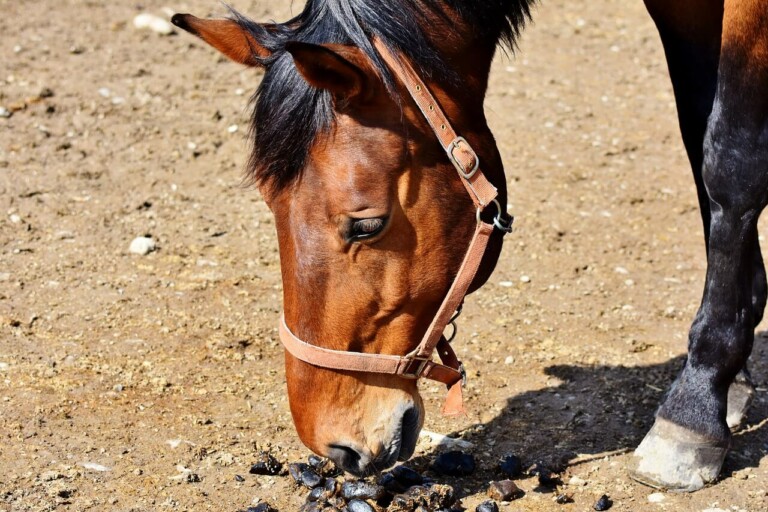Why Does a Horse Eat Manure? Exploring the Causes Behind Coprophagia
Coprophagia, the act of eating feces, is a natural behavior in many animal species. However, it is generally considered abnormal behavior in adult horses. So why does a horse eat manure? There are several theories behind this curious equine behavior.
Eating Manure in Foals
In foals coprophagia is completely normal. They will consume the manure of their dam from around 5 days of age until 3-4 months old. The frequency peaks at 2 months when a foal may eat manure every 4-9 hours.
Consuming manure helps populate the foal’s digestive tract with essential microbes and gut flora. The mare’s manure also provides the foal with important nutrients and antibodies. As the foal’s own digestive system matures and gut flora establishes, the coprophagia decreases and eventually ceases.
Coprophagia in Adult Horses
While normal in foals, eating manure in mature horses is considered an abnormal behavior. There are several theories behind why an adult horse may consume manure:
- Hunger and Boredom
Horses that are underfed or hungry may eat manure out of desperation. Free-roaming horses have been observed eating manure piles when grazing is scarce. Stabled horses with limited hay rations or infrequent feeding times are also more likely to eat manure.
Boredom is another potential cause. Horses with inadequate mental stimulation or turnout time may develop manure-eating habits. Providing enrichment, increasing turnout, and using slow-feeders for hay can help curb this behavior.
- Dietary Issues
Diets lacking adequate forage and fiber are linked with coprophagia. Horses need continuous access to hay or grazing to keep their digestive system functioning properly. Feeding high levels of cereal grains rich in carbohydrates and starch may also encourage manure eating.
- Nutritional Deficiencies
Manure contains undigested nutrients like vitamins, minerals, and electrolytes. Horses with nutritional deficiencies may eat manure in an attempt to supplement their diet. However, most healthy horses on balanced diets should not need to do this.
- Digestive Upset
Disruption of the delicate microbial balance in the hindgut could lead to coprophagia. Sudden diet changes, illness, antibiotics, parasitism, and other factors can disturb the horse’s digestive function. Consuming manure may help re-establish proper gut flora.
- Medical Conditions
Certain health disorders like equine motor neuron disease have been associated with increased manure eating. However, in most cases this is likely linked to nutritional factors like vitamin E deficiency rather than the condition itself being the direct cause.
Stopping Coprophagia in Horses
While occasional manure eating generally causes no harm, it is best to discourage this behavior in mature horses. Consuming manure can increase the risk of parasitic infections and bacterial issues.
Here are some tips to stop coprophagia:
-
Provide free-choice hay and maximize turnout on pasture
-
Feed a balanced diet with adequate vitamins and minerals
-
Divide daily rations into several small meals throughout the day
-
Slowly transition diet changes over 2-3 weeks
-
Use slow-feed hay nets to extend feeding time
-
Address any underlying medical issues
-
Increase mental stimulation and turnout time
-
Work with an equine nutritionist to formulate an optimal diet
-
Use exclusion devices like grazing muzzles if the horse eats manure in turnout
In most cases, coprophagia resolves by identifying and correcting the underlying cause. Ensuring adequate roughage intake, proper nutrition, and mental enrichment are key to curbing this behavior in horses. Monitoring the horse’s health and working with a veterinarian can also help determine if there are any underlying medical factors to address. With patience and by making management changes, it is usually possible to stop horses from eating manure.
WHY DO FOALS EAT MANURE? // Versatile Horsemanship
FAQ
How do I get my horse to stop eating poop?
Is it good to leave horse manure in the pasture?
What is the purpose of horse manure?
- A Complete Guide to Caring for Yuki Cherry Blossom Shrub - January 23, 2025
- Identifying Red Hot Poker Seeds: What to Look For When Harvesting Torch Lily Pods - January 23, 2025
- A Complete Guide to Harvesting Evening Primrose Seeds - January 23, 2025

